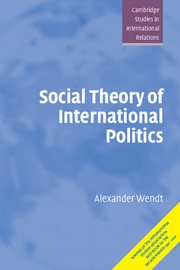Book contents
- Frontmatter
- Contents
- Acknowledgements
- Dedication
- 1 Four sociologies of international politics
- Part I Social theory
- Part II International politics
- 5 The state and the problem of corporate agency
- 6 Three cultures of anarchy
- 7 Process and structural change
- 8 Conclusion
- Bibliography
- Index
- Miscellaneous Endmatter
8 - Conclusion
Published online by Cambridge University Press: 05 September 2012
- Frontmatter
- Contents
- Acknowledgements
- Dedication
- 1 Four sociologies of international politics
- Part I Social theory
- Part II International politics
- 5 The state and the problem of corporate agency
- 6 Three cultures of anarchy
- 7 Process and structural change
- 8 Conclusion
- Bibliography
- Index
- Miscellaneous Endmatter
Summary
The subject of this book was the ontology of international life. Ontology is not something that most IR scholars spend much time thinking about. Nor should they. The primary task of IR social science is to help us understand world politics, not to ruminate about issues more properly the concern of philosophers. Yet even the most empirically minded students of international politics must “do” ontology, because in order to explain how the international system works they have to make metaphysical assumptions about what it is made of and how it is structured. This is true of all explanatory endeavors, not just IR: “[n]o science can be more secure than the unconscious metaphysics which tacitly it presupposes.” This is because human beings do not have direct, unmediated access to the world. All observation is theory-laden, dependent on background ideas, generally taken as given or unproblematic, about what kinds of things there are and how they are structured. We depend on these ontological assumptions particularly when the objects of our inquiry are not observable, as in IR. The problem comes with the fact that in so conditioning our perceptions, ontologies inevitably influence the content of our substantive theories. In this book I tried to show that Neorealism's problematic conclusions about international politics stem from its underlying materialist and individualist ontology, and that by viewing the system in idealist and holist terms we could arrive at a better understanding.
- Type
- Chapter
- Information
- Social Theory of International Politics , pp. 370 - 378Publisher: Cambridge University PressPrint publication year: 1999



